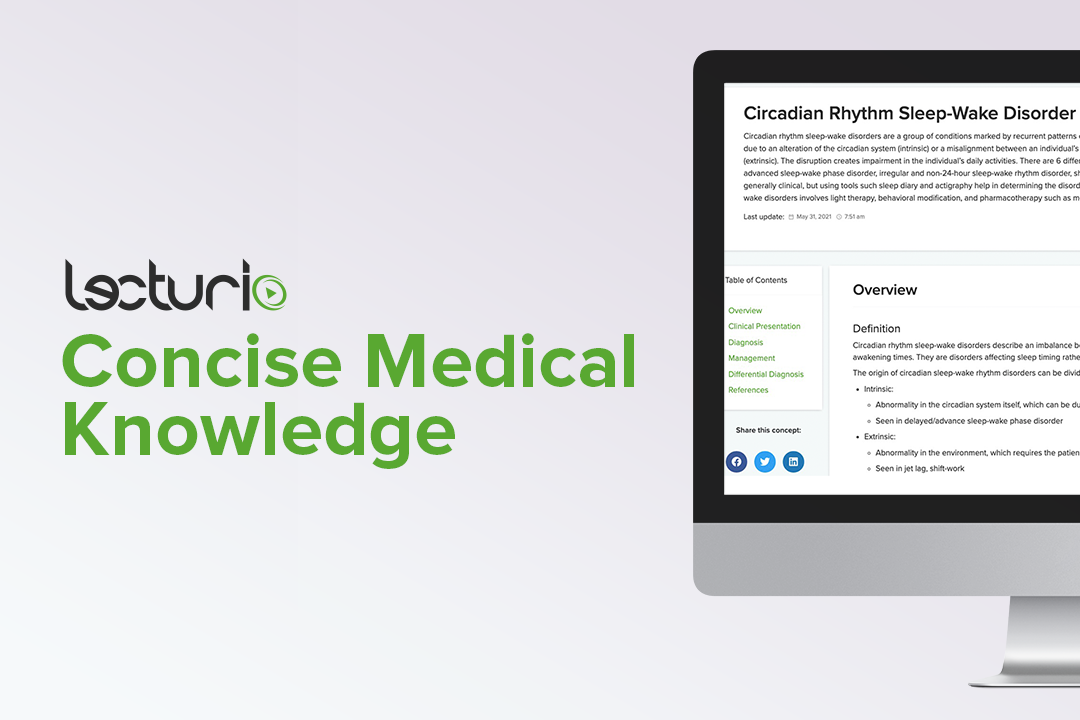Playlist
Show Playlist
Hide Playlist
Sleep-wake Phase Disorder: Advance, Irregular, and Non-24-hour
-
Slides Sleep Disorders Circadian Rhythm.pdf
-
Download Lecture Overview
00:00 Now, let's talk about advanced sleep-wake phase disorder. Here, we're looking at that same sleep pattern over the course of the week and we see that sleep onset is earlier than desired. Patients are going to bed earlier than they would like to. 00:16 Again, the awakening time is also earlier than desired and importantly the sleep quality and duration are preserved. So these are people that are going to bed and sleeping earlier than they would want. Risk factors include older age. As we age, our sleep time becomes earlier and earlier in the day. There is also an autosomal dominant familial variant as a result of missed sense mutations that result in a shorter circadian period. The typical presentation is a patient who just can't stay awake during the evening. These are our early birds. Now let's talk about irregular sleep-wake rhythm disorder. Here, you can see that same typical pattern of sleep over the course of the week and now sleep is significantly disrupted and erratic. 01:04 There are periods of wakefulness and sleep that are not consolidated leading to significant fragmentation of sleep episodes over the course of 24 hours. There is no clear circadian rhythm, no standard sleep time or awake time in these patients. 01:21 dysfunction of the suprachiasmatic nucleus likely plays a critical role. The brain doesn't know when to wake up and there is not a consistent trigger for the brain to wake. Risk factors include neurodegenerative disorders and we can see this fragmentation of a regular sleep-wake rhythm in patients with advanced dementia. 01:41 Patients will report more than 3 bouts of sleep with each one lasting 1-4 hours. 01:47 Now, let's talk about non-24-hour sleep-wake rhythm disorder. So normally, the circadian rhythm is around 24 hours and patients with this disorder will have a circadian sleep-wake cycle that begins greater than or less than that 24-hour period. 02:04 And we can call this a free running disorder. So you see here on Monday night the patient goes to bed around 11 and that normal circadian rhythm would have the patient go into bed at 11 every time of the week. But here, we see that pushed out. 02:18 So it's a progressive free running and lengthening of the circadian rhythm in this patient. The sleep duration is still the same and the quality of the sleep can be maintained but over time progressive dysfunction and excessive daytime sleepiness can occur. In terms of risk factors, blindness can contribute to a loss of the normal sleep-wake cycle and circadian rhythm. Traumatic brain injury can get the brain out of its normal circadian rhythm and we can see alterations in non-24-hour circadian rhythms. And developmental delay can be associated with non-24-hour circadian rhythms. In general, we see insomnia at night in these patients, difficulty with morning arousals, increased daytime sleepiness, and at times patients will have sleep-wake timing that is aligned with the environment. The environment
About the Lecture
The lecture Sleep-wake Phase Disorder: Advance, Irregular, and Non-24-hour by Roy Strowd, MD is from the course Sleep Disorders.
Included Quiz Questions
A patient with a history of traumatic enucleation and resulting blindness seven years ago presents to your clinic because of increased daytime sleepiness and insomnia at night. Occasionally, she has a good night’s sleep without interruptions and wakes up feeling rested. Which circadian rhythm sleep–wake disorder do you suspect?
- Non-24-hour sleep–wake rhythm disorder
- Delayed sleep–wake phase disorder
- Advanced sleep–wake phase disorder
- Irregular sleep–wake rhythm disorder
- Shift work disorder
Which term describes a sleep disorder in which sleep quality and duration are preserved but sleep onset is altered?
- Sleep–wake phase disorder
- REM sleep behavior disorder
- NREM sleep behavior disorder
- Obstructive sleep apnea
- Depression
Customer reviews
5,0 of 5 stars
| 5 Stars |
|
5 |
| 4 Stars |
|
0 |
| 3 Stars |
|
0 |
| 2 Stars |
|
0 |
| 1 Star |
|
0 |




